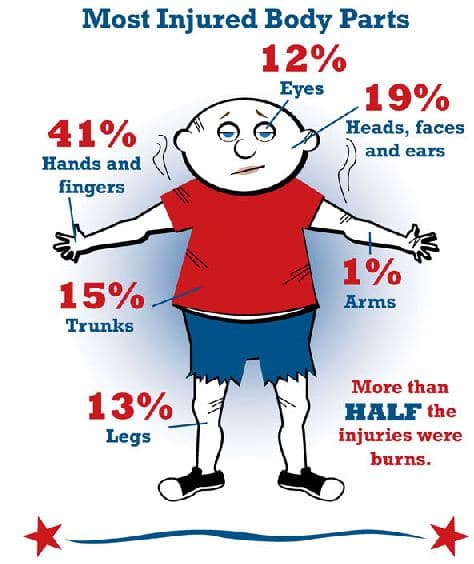Lighting a fuse or sparkler is like holding a ticking time bomb; odds are someone, most likely a child, is going to be hurt. Every year nurses are called upon to try and heal the wounded from fireworks injuries.
Now there is a concerted effort to prevent the tragedy before it occurs. The Emergency Nurses Association (ENA) has joined the National Association of Pediatric Nurse Practitioners, the National Association of School Nurses and other health organizations in an alliance with the National Fire Protection Association calling for an end to the use of personal fireworks. The goal, educate parents and caretakers before there are more injuries.
Here is why: the numbers are staggering, in 2011 fireworks caused an estimated 17,800 fires resulting in eight deaths, 40 injuries and $32 million in direct property damage. 2013 injury figures show U.S. hospital emergency rooms treated an estimated 11,400 people for fireworks related injuries. Children under the age of five experienced a higher estimated per capita injury rate than any other age group.
How many times have you, as a nurse, had to cradle a badly burnt six year old or counseled a parent about their youngster’s loss of a finger?
The U.S. Consumer Product Safety Commission warns that even sparklers burn at nearly 2,000 degrees, hot enough to melt, wood, plastics and some metals and inflict terrible burns on mostly young people. Sixty percent of injuries and deaths from fireworks occur in the weeks just before and after the 4th of July. Most injuries are to the hands and fingers, head and face and the eyes caused mainly from firecrackers, bottle rockets and sparklers. The Emergency Nurses Association asserts the damage from fireworks can cause permanent scaring, both physically and mentally to children. “The extremities are essential for mobility; head injury is particularly critical: and burns can cause both pain and deformity. The message is very straightforward: fireworks are not safe to handle, watch them from a distance,” said the president of the ENA.
The National Fire Protection Association is so troubled by the carnage and damage from fireworks that they have created the Alliance to Stop Consumer Fireworks. They urge everyone to attend professional fireworks and never buy or use fireworks at home.
Realizing fireworks are still used by families; the Consumer Product Safety Commission has developed these essential safety tips:
- Never allow young children to play with or ignite fireworks.
- Avoid buying fireworks that are packaged in brown paper because this is often a sign that the fireworks were made for professional displays and that they could pose a danger to consumers.
- Always have an adult supervise fireworks activities. Parents don’t realize that young children suffer injuries from sparklers. Sparklers burn at temperatures of about 2,000 degrees – hot enough to melt some metals.
- Never place any part of your body directly over a fireworks device when lighting the fuse. Back up to a safe distance immediately after lighting fireworks.
- Never try to re-light or pick up fireworks that have not ignited fully.
- Never point or throw fireworks at another person.
- Keep a bucket of water or a garden hose handy in case of fire or other mishap.
- Light fireworks one at a time, then move back quickly.
- Never carry fireworks in a pocket or shoot them off in metal or glass containers.
- After fireworks complete their burning, douse the spent device with plenty of water from a bucket or hose before discarding it to prevent a trash fire.
- Make sure fireworks are legal in your area before buying or using them.
Remember, while they may be pretty to watch, the damage from personal use of fireworks is more than just statistics or numbers on a page; they are real people – sons, daughters parents and grandparents – real flesh-and-blood victims. Think of them and the nurse who is waiting in the emergency room.
Sources :
- California Casualty Earns Financial Stability Rating® of A, Exceptional, From Demotech, Inc. - April 28, 2025
- Music & Arts Grant Recipients – 2024 - December 13, 2024
- Understanding Auto and Home Insurance Rate Changes - December 3, 2024

